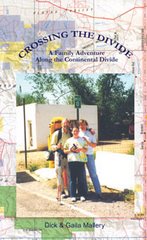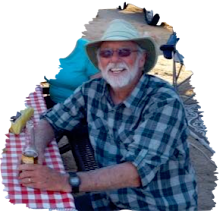
Colin Fletcher, acclaimed, reclusive writer on backpacking
By Valerie J. Nelson,
LOS ANGELES — Colin Fletcher, who was considered the father of modern backpacking for his lyrical and practical writings on hiking, including "The Complete Walker" and "The Man Who Walked Through Time," died in June in Monterey, Calif. He was 85.
Mr. Fletcher died at Community Hospital of the Monterey Peninsula of complications related to old age and injuries suffered in 2001 after he was hit by a car, said Chris Cassidy, a business associate.
"He brought this idea that you didn’t have to be a nut case to take long solitary walks in the wilderness at a time when a lot of people were really looking for ways to create holistic lives and escape from the craziness of Vietnam and the stresses of the ’60s," said Jonathan Dorn, editor in chief of Backpacker magazine.
Bruce Hamilton, deputy executive director of the Sierra Club, said that Fletcher helped start a movement by "speaking as an adventurist who would share his own exploits then tell you to lighten your load by cutting your toothbrush in half."
"He was to backpacking what Jack Kerouac had been to road trips," wrote Annette McGivney in Backpacker magazine in 2002.
Romantic conflict inadvertently inspired Mr. Fletcher’s walking-writing career.
In 1958, Mr. Fletcher decided to hike the length of California from Mexico to Oregon so that he could engage in "contemplative walking" and decide whether to get married.
Six months and 1,000 miles later, he married his girlfriend and wrote his first book, "The Thousand-Mile Summer" (published in 1964), which detailed his route across the Mojave Desert and up the Sierra Nevada range.
The marriage ended within weeks, but the man some call "the J. D. Salinger of the high country" had discovered a way to communicate.
"He found he could touch people in a grand and far-reaching way and have friends without having them in his hair all the time," said Chip Rawlins, who helped update Mr. Fletcher’s "The Complete Walker IV" (2002) and considered Fletcher one of his heroes. The first edition of "The Complete Walker," published in 1968, is an exhaustive guide to outdoor travel that is regarded as the backpacker’s bible.
"Colin was cranky, opinionated, irascible, yet I found him quite wonderful, actually," Rawlins said.
Outside Mr. Fletcher’s Carmel Valley home hung a sign that said: "Beware of the Man!" Once he touched fame, Mr. Fletcher guarded his home’s location and scratched a decoy name on his mailbox.
In 1963, beckoned by the Grand Canyon’s beauty, Mr. Fletcher became one of the first humans to walk the length of the chasm. He wrote about the two-month trek in "The Man Who Walked Through Time" (1968).
"I saw that my decision to walk through the Canyon could mean more than I knew. I saw that by going . . . deep into the space and the silence and the solitude, I might come as close as we can at present to moving back and down through the smooth and apparently impenetrable face of time," he wrote.
The "artfully worded account" "introduced an increasingly nature-hungry public to the spiritual and physical rewards of backpacking," McGivney wrote in 2002. The book remains in print.
In all, Mr. Fletcher wrote seven books in a 35-year span, providing what he termed "great, granular detail" about camping, he told the Associated Press in 1989.
At 67, Mr. Fletcher hiked and paddled solo 1,750 miles down the Green and Colorado rivers and recounted the experience in "River: One Man’s Journey Down the Colorado, Source to Sea" (1997).
Of his need for the trip, he wrote: "I needed something to pare the fat off my soul. . . . And I knew . . . there is nothing like a wilderness journey for rekindling the fires of life."
Of his works, Mr. Fletcher favored "The Man From the Cave" (1981), possibly because he related to the main character — a gold prospector who inhabited a cave in the Nevada desert, said Carl Brandt, his longtime agent.
"He had worked out a life for himself that was very, very happy," Brandt said. "The three things he loved the most were walking and writing and then, oddly enough, tennis."
Born March 14, 1922, in Cardiff, Wales, Mr. Fletcher was an only child who traced his love of walking to his mother, who enjoyed venturing out in the rain.
He first backpacked as a commando for the Royal Marines in World War II and spent five years in Africa, mainly farming. Several odd jobs followed, including prospecting and laying out roads for a mining company in Canada.
Well into his 70s, Mr. Fletcher continued to hike. He was working on an autobiography when he was struck by a car while walking near his house. He suffered severe brain trauma, many broken bones, and other injuries.
As he aged, Mr. Fletcher had admitted it was harder for him to convey a sense of wonder about the back country. "I’m not young anymore," he said in the 1989 AP story, echoing a line from "The Thousand-Mile Summer:" "I’m no longer rich with the rewards of inexperience."
By Valerie J. Nelson,
LOS ANGELES — Colin Fletcher, who was considered the father of modern backpacking for his lyrical and practical writings on hiking, including "The Complete Walker" and "The Man Who Walked Through Time," died in June in Monterey, Calif. He was 85.
Mr. Fletcher died at Community Hospital of the Monterey Peninsula of complications related to old age and injuries suffered in 2001 after he was hit by a car, said Chris Cassidy, a business associate.
"He brought this idea that you didn’t have to be a nut case to take long solitary walks in the wilderness at a time when a lot of people were really looking for ways to create holistic lives and escape from the craziness of Vietnam and the stresses of the ’60s," said Jonathan Dorn, editor in chief of Backpacker magazine.
Bruce Hamilton, deputy executive director of the Sierra Club, said that Fletcher helped start a movement by "speaking as an adventurist who would share his own exploits then tell you to lighten your load by cutting your toothbrush in half."
"He was to backpacking what Jack Kerouac had been to road trips," wrote Annette McGivney in Backpacker magazine in 2002.
Romantic conflict inadvertently inspired Mr. Fletcher’s walking-writing career.
In 1958, Mr. Fletcher decided to hike the length of California from Mexico to Oregon so that he could engage in "contemplative walking" and decide whether to get married.
Six months and 1,000 miles later, he married his girlfriend and wrote his first book, "The Thousand-Mile Summer" (published in 1964), which detailed his route across the Mojave Desert and up the Sierra Nevada range.
The marriage ended within weeks, but the man some call "the J. D. Salinger of the high country" had discovered a way to communicate.
"He found he could touch people in a grand and far-reaching way and have friends without having them in his hair all the time," said Chip Rawlins, who helped update Mr. Fletcher’s "The Complete Walker IV" (2002) and considered Fletcher one of his heroes. The first edition of "The Complete Walker," published in 1968, is an exhaustive guide to outdoor travel that is regarded as the backpacker’s bible.
"Colin was cranky, opinionated, irascible, yet I found him quite wonderful, actually," Rawlins said.
Outside Mr. Fletcher’s Carmel Valley home hung a sign that said: "Beware of the Man!" Once he touched fame, Mr. Fletcher guarded his home’s location and scratched a decoy name on his mailbox.
In 1963, beckoned by the Grand Canyon’s beauty, Mr. Fletcher became one of the first humans to walk the length of the chasm. He wrote about the two-month trek in "The Man Who Walked Through Time" (1968).
"I saw that my decision to walk through the Canyon could mean more than I knew. I saw that by going . . . deep into the space and the silence and the solitude, I might come as close as we can at present to moving back and down through the smooth and apparently impenetrable face of time," he wrote.
The "artfully worded account" "introduced an increasingly nature-hungry public to the spiritual and physical rewards of backpacking," McGivney wrote in 2002. The book remains in print.
In all, Mr. Fletcher wrote seven books in a 35-year span, providing what he termed "great, granular detail" about camping, he told the Associated Press in 1989.
At 67, Mr. Fletcher hiked and paddled solo 1,750 miles down the Green and Colorado rivers and recounted the experience in "River: One Man’s Journey Down the Colorado, Source to Sea" (1997).
Of his need for the trip, he wrote: "I needed something to pare the fat off my soul. . . . And I knew . . . there is nothing like a wilderness journey for rekindling the fires of life."
Of his works, Mr. Fletcher favored "The Man From the Cave" (1981), possibly because he related to the main character — a gold prospector who inhabited a cave in the Nevada desert, said Carl Brandt, his longtime agent.
"He had worked out a life for himself that was very, very happy," Brandt said. "The three things he loved the most were walking and writing and then, oddly enough, tennis."
Born March 14, 1922, in Cardiff, Wales, Mr. Fletcher was an only child who traced his love of walking to his mother, who enjoyed venturing out in the rain.
He first backpacked as a commando for the Royal Marines in World War II and spent five years in Africa, mainly farming. Several odd jobs followed, including prospecting and laying out roads for a mining company in Canada.
Well into his 70s, Mr. Fletcher continued to hike. He was working on an autobiography when he was struck by a car while walking near his house. He suffered severe brain trauma, many broken bones, and other injuries.
As he aged, Mr. Fletcher had admitted it was harder for him to convey a sense of wonder about the back country. "I’m not young anymore," he said in the 1989 AP story, echoing a line from "The Thousand-Mile Summer:" "I’m no longer rich with the rewards of inexperience."









No comments:
Post a Comment